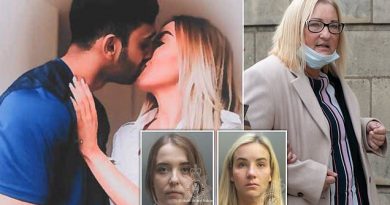I feel ‘apologetic’ for the crime we didn’t commit, says a Kiwi Sri Lankan after terror attack
“I had never feared going to the supermarket in my life.”
The feeling that struck Suveen Sanis Walgampola, 29, will be familiar to many after the terror attack at Countdown in New Lynn, Auckland.
But it’s not the possibility of another terror attack that has Walgampola worried.”People are walking around with a radio and there is a sense that they are looking for you,” he said.
“Tense and apologetic is what I feel right now, a real mix of sadness, fear and embarrassment.”
That feeling of fear expressed by Walgampola, who came to New Zealand from Sri Lanka, was spoken of by others interviewed by the Herald. They spoke of being gripped by the same feeling they were under scrutiny in the wake of the attack.
Those people come from communities that do not make up the majority (70 per cent) of New Zealand’s population. Instead, they have roots in South and West Asia and make up about 10 per cent of New Zealand’s population.
On Friday afternoon, Ahamed Aathil Mohamed Samsudeen went into a supermarket in New Lynn and stabbed shoppers before he was gunned down by officers of the police anti-terror squad who were tailing him.
He was under 24-hour police surveillance when he entered Countdown LynnMall on Friday and grabbed a knife from the shelves before running through the aisles shouting. The Islamic State supporter stabbed seven shoppers before being shot dead by police. Samsudeen moved to New Zealand from Sri Lanka in 2011.
For the first time in almost 30 years, Walgampola said Friday’s terror attack made him afraid to be in a public place and somehow felt the sense of guilt for a crime a terrorist committed, which had nothing to do with him.
“He doesn’t represent us, and we are not him.”
Two days after the attack, Walgampola went to Pak’nSave at Auckland’s Sylvia Park with his mother because he didn’t feel comfortable letting her go on her own.
“I just came back from grocery shopping, it felt tense, it almost feels like being very apologetic, [and] you do feel responsible,” he said.
“I shouldn’t be feeling this way and I don’t think anyone should be feeling this way, just because one ‘lone wolf’ terrorist who happened to have come from the same part of the world we came from.
Walgampola moved to New Zealand in the early 90s from the capital of Sri Lanka with his parents.He is a co-founder of DulaityNZ an organisation that aims to creates a supportive and inclusive community, to bring awareness to the invisible barriers [of racism and prejudice] faced by Sri Lankan youth.
“The stabbing in Countdown doesn’t represent any race, religion or ethnicity,” he said.
According to Government data, there are 16,920 Sri Lankans immigrants living in New Zealand. Just over 3500 of this group identify as Sri Lankan Tamil,as did Samsudeen.
The impact reaches before that community to others. Pakistani-born New Zealander and social worker Tayyaba Khan said people in the community are afraid and there is a heightened sense of vigilance after the Friday attack.
Khan, now 39, moved to New Zealand when she was 9 years old, and said the country was a lot more open, tolerant, and willing to understand diversity in the community than when she arrived.
However, after the March 15 terror attacks in Christchurch, she says overt racism has been more easily identifiable.
“It’s like the wound that was there but over time it just got worse.
“And the Friday’s terrorist attack will only further emphasise the distrust within our society,” Khan said.
After Friday, many ethnic communities, not just the Muslim community, are “freaking out” in terms of what the attack means for them and for the potential of retaliation towards migrants, she said.
“Retaliation comes in many forms and there is the worse form where someone actually physically is hurting you,” she said.
“In the last couple of years, we have seen that racism is a real reality for us and we don’t ignore it anymore,” she said.
Khan said the effect of the attack extends beyond the walls of the Lynn Mall.”And we need to acknowledge that fear because the root of that fear extends beyond that particular attack,” Khan said.
New Zealand Sri Lankan Foundation president Jereeth Abdeen said the community appreciated the aroha and support shown to them from wider New Zealand whanau.
“Such sentiments encourages co-existence and harmony which undoubtedly encourage efforts towards healing from such horrific acts,” he said.
Minister for Ethnic Communities, Priyanca Radhakrishnan said this was an attack by an individual, which is not a reflection of any migrant or religious groups.
She said the Government was working to strengthen our social cohesion to make New Zealand a safer place for everyone.
“Our South Asian community should absolutely not feel the need to be apologetic – this was an attack by an individual, not a culture, not a religion or an ethnicity, but an individual who was gripped by an ideology that is not supported by anyone here,” Radhakrishan said.
“We are taking measures to ensure people are able to feel safe … New Zealand is considered internationally to have a high level of social cohesion.
“But we know there’s always more work to do to ensure Aotearoa is a place where everyone feels safe, valued, heard, has a strong sense of belonging, and is able to participate fully in society – and that’s why the Government is working to strengthen our social cohesion.”
Green MP Golriz Ghahraman said there was a lot of immediate abuse towards south Asian immigrants after the identity of the terrorist was revealed, and she hoped the Government wouldn’t make rash changes that are anti-refugee or anti-migrant.
“There was an indication immediately after the attack that the Government would look at why it was supposedly difficult to deport this person,”
“We need to look into radicalisation rather than turn this into an oversimplified issue of migrants and refugees,” she said.
The immediate backlash againstmigrants of colour was a “huge shame” because most refugees and migrants come from the places like Afghanistan escaping Islamist terrorism to be safe, Ghahraman said.
But after the Christchurch attack, we’ve had the background and what was pledged to for inclusion and equality here.
“We are better prepared as a society to stand up against racism in that way, but we have to do that actively because it [racism] is definitely on the rise after this [Friday’s] attack, we’ve seen it so those fears are defiantly valid,” she said.
Assistant Commissioner Investigations Lauano Sue Schwagler today confirmed said all remaining New Lynn terror attack victims are out of intensive care and stable in wards. She said four victims of the seven were continuing to recover at home.
New Zealand Police Deputy Commissioner Wally Haumaha said the police condemned the “lone wolf” attack but have reiterated that an individual’s view wasn’t a reflection of the entire community.
“We want to assure our community, including our Muslim and Sri Lankan communities, that the incident was the actions of a lone individual, whose views were not representative of any community,” he said.
“He did not represent any New Zealand community and responsibility must lie with him alone.”
Haumaha said the people can expect to see a heightened police presence over the coming days, and they are conducting reassurance patrols at a number of mosques and other places of worship throughout New Zealand.
“We have also been engaging with a number of ethnic community leaders to reassure them.
“Police want to encourage anyone who has been subjected to behaviour that shows hate towards an individual or a group, to contact police,” he said.
Source: Read Full Article

/cloudfront-ap-southeast-2.images.arcpublishing.com/nzme/IXGTNSK4OY2QEKPCNX5QZ5XJ5E.jpg)
/cloudfront-ap-southeast-2.images.arcpublishing.com/nzme/CWGR5HZNV3CCZEVDOSH5CQMAOE.jpg)
/cloudfront-ap-southeast-2.images.arcpublishing.com/nzme/BOM3UZOJRHEKCA7QQ2B3MFR6BA.jpg)
/cloudfront-ap-southeast-2.images.arcpublishing.com/nzme/MUS7DCYI3IAJ2RUA5HKTQ353TE.jpg)
/cloudfront-ap-southeast-2.images.arcpublishing.com/nzme/AYOC2EUNKY5YTGMIR2MSR6K5JI.jpg)
/cloudfront-ap-southeast-2.images.arcpublishing.com/nzme/T34HNT2WARLC7H32HF6HHJIHPQ.jpg)

